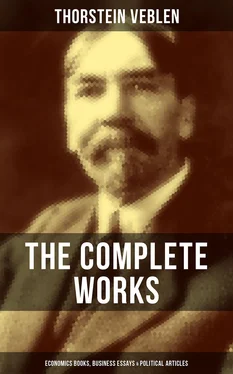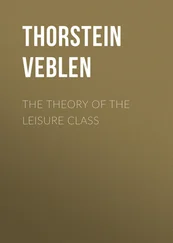Some reference has also been made already to the technological value of those kindly, “humane” sentiments that are bound up with the parental bent, - if they may not rather be said substannntially to constitute the parental bent. It is of course in the non-mechanical arts of plant and animal breeding that these humane extensions of the parental instinct have their chief if not their only industrial value, both in furthering the day’s work and in contributing to the advance of technology. In the primary mechanic arts, e. g., an affectionate disposition of this kind toward the inanimate appliances with which their work is occupied does no doubt still, as ever, to some extent animate the workmen as well as those who may have the remoter oversight of the work. But the part played by such humane sentiments is after all relatively slight in men’s dealings with brute matter, nor do they invariably conduce to expeditious work or to a hard-headed insight into the mechanics of those things with which this work has to do. In fact such tender emotions so placed may somewhat easily become a source of mischief, in a manner similar to the mischievous technological consequences of anthropomorphism already spoken of.
It is otherwise with the bearing of the parental bent on the arts of tillage and cattle-breeding. Here its promptings are almost wholly serviceable to technological gain as well as to assiduous workmanship. The kindly sentiments intrinsic to the parental bent are admirably in place in the care of plants and animals, and their good effects in so giving a propitious turn to the technology of early tillage and cattle-breeding are only re-enforced by the parental and workmanlike inclination to husband resources and make the most of what comes to hand. The particular turn given to the anthropomorphic bias by this line of preconceptions also is rather favourable than otherwise to a working insight into the requirements of the art. And it has had certain specific consequences for the early technology of husbandry, as well as for the early culture in which husbandry was the chief material factor, such as to call for a more circumstantial account.
Under the canons of workmanship a teleological animus - an instinctive or “spiritual” nature - is imputed to the plants and animals brought into domestication. The art of husbandry proceeds on the apprehended needs and proclivities so imputed, and the technology of the craft therefore takes the form of a “tendance” designed to further these quasi-animistically conceived beings in whatever ends they have at heart by virtue of their natural bent, and to so direct this tendance upon them as will conduce to shaping their scheme of life in ways advantageous to man.
Like other sentient beings, as is known to shrewd and unsophisticated man, they have spiritual needs as well as material needs, and they are putatively to be influenced by the attitude of their human cousins towards them and their conduct, interests, and adventures. Further, their life and comfort are manifestly conditioned by the run of the seasons and of the weather; various inclemencies are discouraging and discomforting to them, as to mankind, and other vicissitudes of rain and shine and tempest are of the gravest consequence to them for good or ill. Under these delicate circumstances it is incumbent on the keepers of crops and flocks to walk circumspectly and cultivate the goodwill not only of their crops and flocks but also of the natural phenomena that count for so much in the life of the crops and flocks. These natural phenomena are of course also conceived anthropomorphically, in the sense that they too are seen to follow their natural bent and do what they will, - or perhaps more commonly what the personal agents will, in whose keeping these natural phenomena are conceived to lie; for unsophisticated man has no other available terms in which to conceive them and their behaviour than the terms of initiative, design and endeavour immediately given in his own conscious action.
Now, as has already been said, the scheme of life of the crops and flocks is, at least in the main, and particularly in so far as it vitally and always interests their keepers, a scheme of fecundity, fertility and growth. But these matters, visibly and by conscious sentiment, pertain in a peculiarly intimate sense to the women. They are matters in which the sympathetic insight and fellow-feeling of womankind should in the nature of things come very felicitously to further the propitious course of things.
Besides which the life of the women falls in these same lines of fecundity, nurture and growth, so that their association and attendance on the flocks and crops should further the propitious course of things also by the subtler means of sympathetic suggestion. There is a magical congruity of great force as between womankind and the propagation of growing things. And these subtler ways of influencing events are especially to the point in all contact with these non-human sentient beings, since they are speechless and must therefore in the main be led by living example rather than by precept and expostulation. And, again, being sentient, somewhat after the fashion of mankind, it is not to be believed that they have not the gift visibly common to mankind and many animals, of following their leader by force of sympathetic imitation. It may not be easy to say how far this instinctive impulse of imitation, necessarily credited to all phenomena to which anthropomorphic traits are imputed, is to be accounted the ground of all sympathetic magic; but it is at least to be accepted as sufficient to account for much of what is done to induce fertility in flocks and crops.
So that on many accounts it is evident that in the nature of things, the care of flocks and crops is the women’s affair, and it follows that all intercourse with the flocks and crops in the early days had best be conducted by the women, who alone may be presumed intuitively to apprehend what is timely, due and permissible in these premises. It is all the more evident that communion with these wordless others should fall to the women, since the like wordless communion with their own young is perhaps the most notable and engaging trait of their own motherhood. The parental bent also throws a stress of sentiment on this simple and obvious phase of motherhood, such as has made it in all men’s apprehension the type of all kindly and unselfish tendance; at the same time this ubiquitous parental instinct tends constantly to place motherhood in the foreground in all that concerns the common good, in as much as all that is worth while, humanly speaking, has its beginning here. In that early phase of culture in which the beginnings of tillage and cattle-breeding were made and in which the common good of the group was still the chief daily interest about which men’s solicitude and forethought are habitually engaged, motherhood will always have been the central fact in the scheme of human things. So that in this cultural phase the parental bent and the sense of workmanship will have worked together to bring the women into the chief place in the technological scheme; and the sense of imitative propriety, as well as the recognised constraining force exercised by example and mimetic representation through the impulse of imitation, will have guided workmanship shrewdly to play up womankind and motherhood in an ever-growing scheme of magical observances designed to further the natural increase of flocks and crops. Where anthropo-morphic imputation runs free and with conviction, such observances, designed to act sympathetically on the natural course of phenomena, unavoidably become an integral feature of the technological scheme, no less indispensable and putatively no less efficacious to this end than the mechanical operations with which these observances are associated. There is no practicable line of division to be drawn between sympathetic magic and anthropomorphic technology; and in the known cultures of this early type it is for the most part an open question whether the magical observances are to be accounted an adjunct to what we would recognise as the technological routine of the art, or conversely. The two are not commonly held apart as distinct categories, and both are efficacious and indispensable; and in both the felt efficacy runs on much the same grounds of imputed anthropomorphic traits. 57On grounds of magical-technological expediency, then, as well as by force of the sense of intrinsic propriety, women come to take the leading rôle in the industrial community of the early time, and the community’s material interests come to centre about them and their relation to the natural products of the fields; and since this interest bears immediately on the fecundity of the flocks and crops, it is particularly in their character of motherhood that the women come most vitally into the case. The natural produce on which the life of the group depends, therefore, will appertain to the women, in some intimate sense of congruity, so that in the fitness of things this produce will properly come to the good of the community through their hands and will logically be dispensed somewhat at their discretion. So great is the reach of this logic of congruity that in the known cultures which show much reminiscence of this early technological phase it is commonly possible to detect some remnant of such discretionary control of the natural produce by the women. And modern students, imbued with modern preconceptions of ownership and predaceous mastery, have even found themselves constrained by this evidence to discover a system of matriarchy and maternal ownership in these usages that antedate the institution of ownership. Conceivably, the usages growing out of this preferential position of women in the technology and ritual of early husbandry will, now and again, by the uniform drift of habituation have attained such a degree of consistency, been wrought into so rigid a form of institutions, as to have been carried over into a later phase of culture in which the ownership of goods is of the essence of the scheme; and in such case these usages may then have come to be reconstrued in terms of ownership, to the effect that the ownership of agricultural products vests of right in the woman, the mother of the household.
Читать дальше












